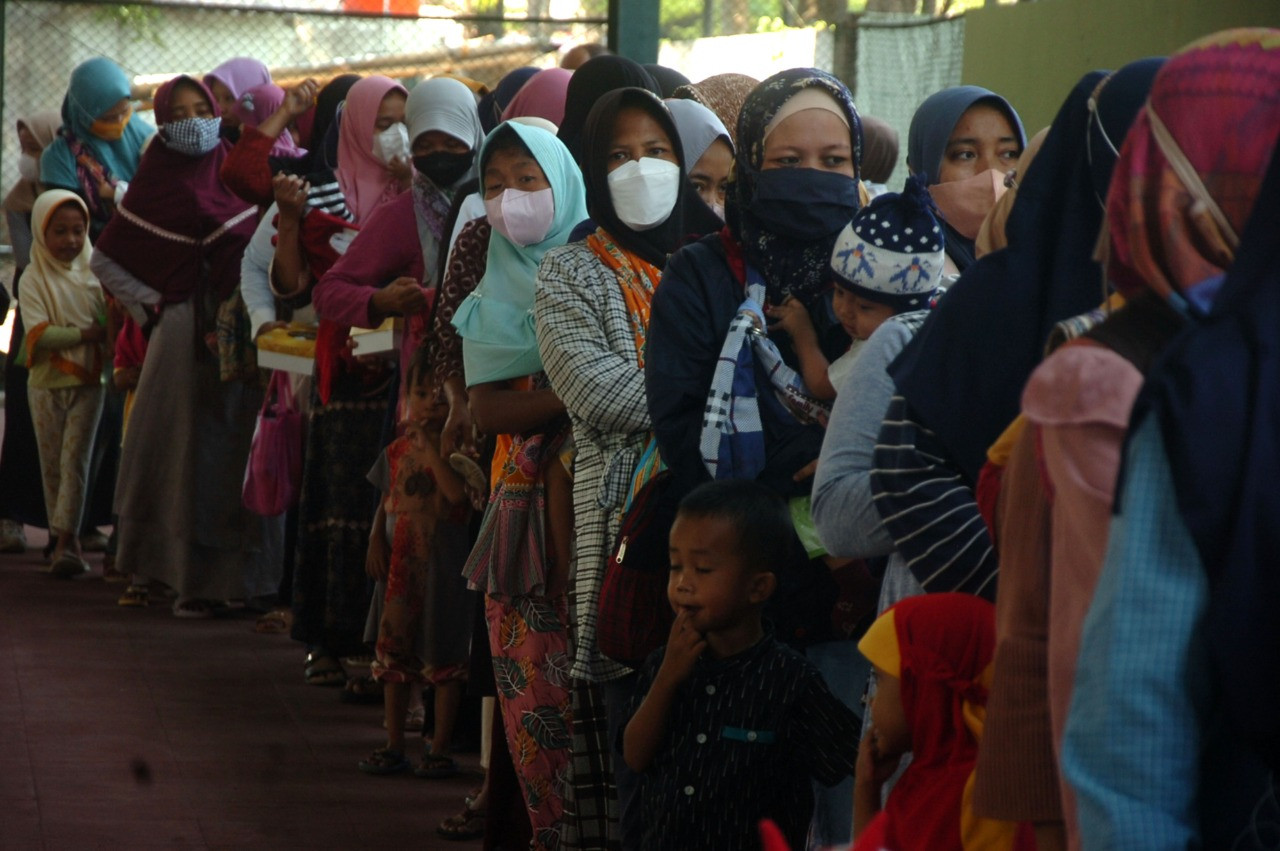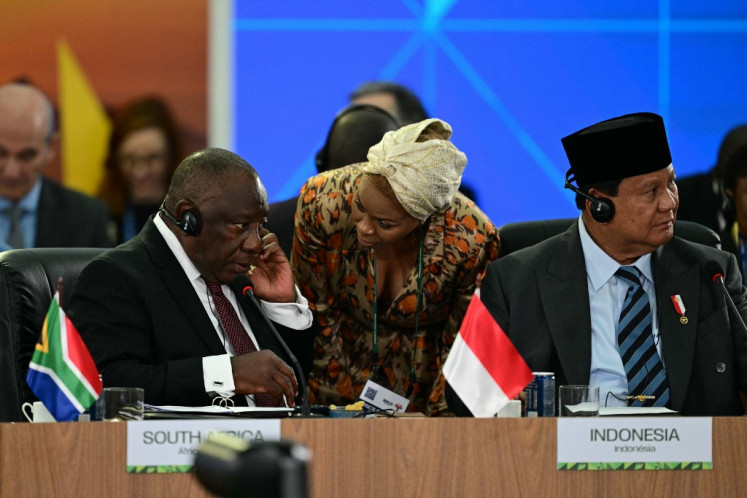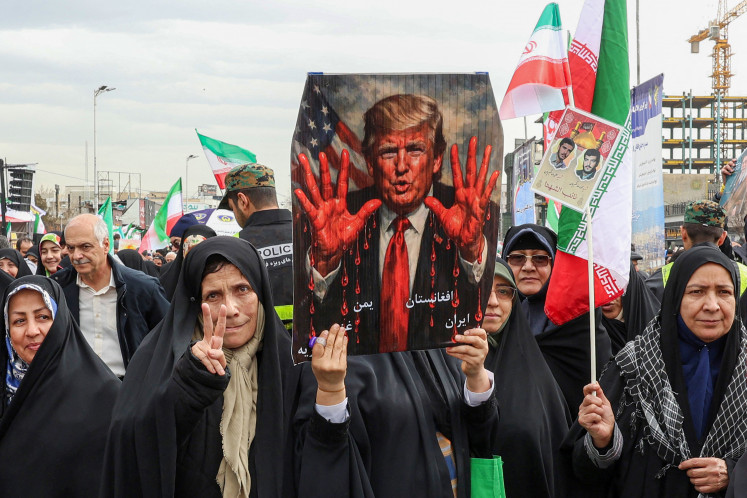Popular Reads
Top Results
Can't find what you're looking for?
View all search resultsPopular Reads
Top Results
Can't find what you're looking for?
View all search resultsHow to make sure we really leave no one behind
The shocking fact is that at least two out of every three people experiencing hunger extremes are themselves small-scale food producers from rural areas.
Change text size
Gift Premium Articles
to Anyone
 Food for all: Low-income people line up for healthy food packages jointly provided by the local administration and the Indonesian Military (TNI) in the Central Java regency of Tegal on July 26, 2022. The COVID-19 pandemic has plunged millions of people in the country into poverty. (Antara/Oky Lukmansyah)
Food for all: Low-income people line up for healthy food packages jointly provided by the local administration and the Indonesian Military (TNI) in the Central Java regency of Tegal on July 26, 2022. The COVID-19 pandemic has plunged millions of people in the country into poverty. (Antara/Oky Lukmansyah)
L
eave NO-ONE behind – this is the theme of this year’s World Food Day, and also an urgent call for the world to face the alarming reality that more and more people are being left behind amid a spiraling global food security crisis as a result of multiple drivers.
These include the impacts of ongoing and protracted conflicts including the war in Ukraine, the COVID-19 pandemic and the climate crisis. Further exacerbating the problems are inflation spikes and dramatic rises in the prices of food, feed, fuel, fertilizers and energy, threatening to create a food access crisis now, and possibly a food availability crisis next season.
Many people have been shocked by the images showing catastrophic levels of acute food insecurity in many parts of the world over recent months and weeks. The latest State of Food Security and Nutrition in the World (SOFI) Report by FAO and its partners estimates that up to 828 million people faced chronic undernourishment in 2021 – 46 million more than in 2020 and 150 million more than in 2019, before COVID-19.
The impacts of the pandemic had already widened existing inequalities, increased extreme poverty, and made eradicating hunger even harder, especially in vulnerable countries.
![]() We clearly have a daunting task before us to achieve the objective of leaving NO-ONE behind, just in terms of feeding the world’s population, let alone offering people a life of peace and equality, and an inclusive and sustainable future. However, we must neither sit back in despair, nor carry on doing things in the same way and expect different results.
We clearly have a daunting task before us to achieve the objective of leaving NO-ONE behind, just in terms of feeding the world’s population, let alone offering people a life of peace and equality, and an inclusive and sustainable future. However, we must neither sit back in despair, nor carry on doing things in the same way and expect different results.
There are meaningful ways to address these challenges.
Let’s take one of the most urgent examples: amid the increasing number of emergencies, conflict situations and disasters we face, one of our top priorities needs to be ensure our support for the livelihoods of those affected and most vulnerable. This support must be better coordinated and more substantial, and it must come in time for crucial planting and livestock production seasons.
The shocking fact is that at least two out of every three people experiencing hunger extremes are themselves small-scale food producers from rural areas. The critical task is to help them to feed themselves, and all of us. It is all too easy for communities to be left behind when they fall into the gaps between emergency aid, development work and efforts to promote peace in conflict areas, and we need to do better at coordinating how we provide and properly target the much-needed support.
Greater solidarity at a global level is also vital. For instance, the world’s most vulnerable nations need global support to help provide social protection to the poorest among their populations, so that they have the instruments to be resilient before disaster hits. Governments must focus on the common good and avoid protectionist measures that could affect international markets if we are to mitigate the potential shocks of food supply shortages by keeping trade open and supply chains moving.
Governments, the private sector, academia, civil society and all relevant stakeholders working hand in hand have a role to play to help empower the most vulnerable by transforming the ways in which our food is produced, delivered and consumed. Crucial to that is providing basic supplies of agricultural inputs, the right training, incentives, innovation and technologies to vulnerable people, including women and youth.
One of the first angles from which to approach the problem is the need for more and better information on who is being left behind and why. If governments have more people-centered data and research at their disposal, they can act on this empirical knowledge to adopt inclusive, responsive and accountable institutions and social practices.
An important step would be for governments to integrate a pledge to leave no one behind into their strategies, plans and budgets for achieving the 2030 Agenda for Sustainable Development and the Sustainable Development Goals (SDGs).
So what can we do collectively to bring all this about at various levels? The bottom line is that all of us can act effectively and efficiently, in a coherent manner and with greater compassion, by speaking up and influencing decision-makers to ensure NO-ONE is left behind.
We can also waste less food, eat nutritious, seasonal food and care for our natural resources like soils and water. In this context, I want to emphasize the vital role of our young people. For the second year running, they are at the center of the World Food
Forum Platform that we are organizing in hybrid model at FAO headquarters in Rome this month (Oct. 17-21), comprising a Global Youth Forum, a Science and Innovation Forum and a Hand-in-Hand Investment Forum. Their ideas and enthusiasm, and their stake in the future, must play a key role in ensuring that action and solidarity are at the center of our thoughts and our passion, to achieve the Four Betters: better production, better nutrition, a better environment and a better life for all, leaving NO ONE behind!
***
The writer is director general of Food and Agriculture Organization.










